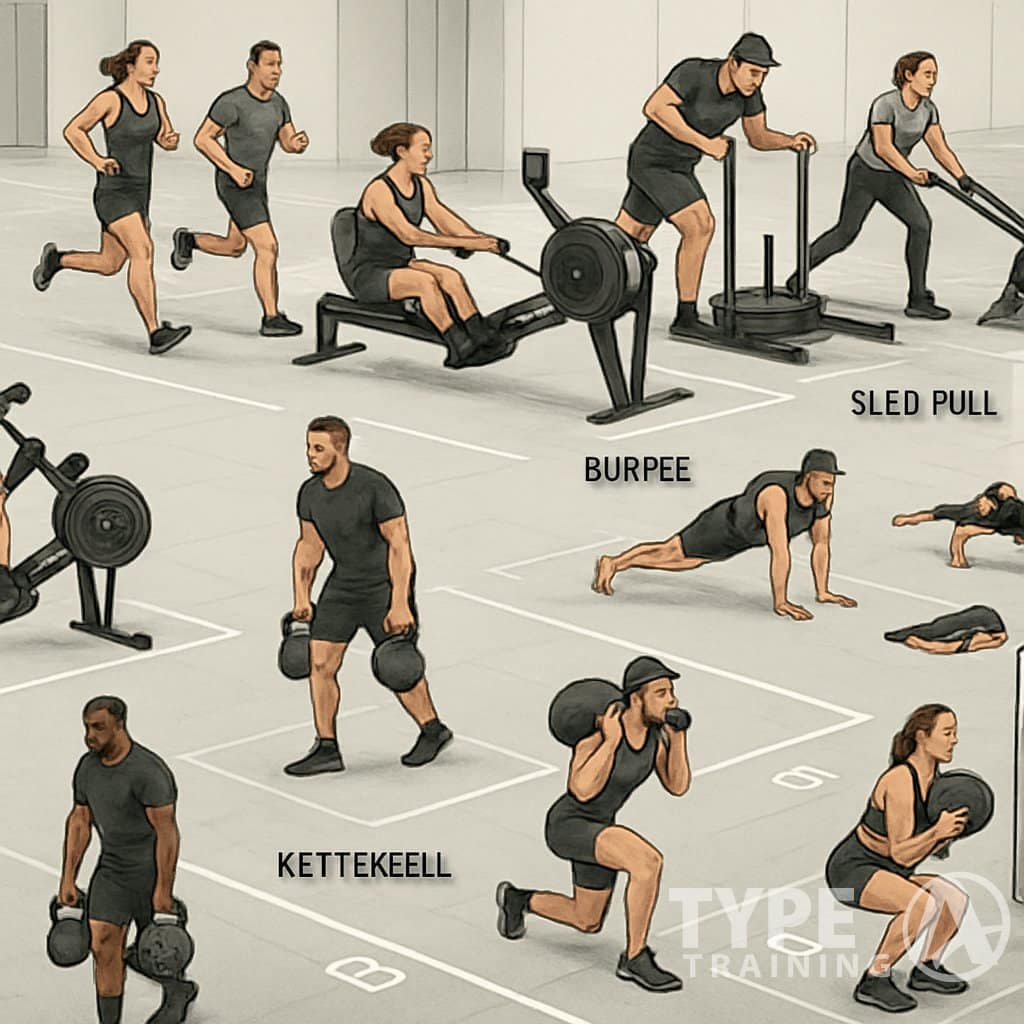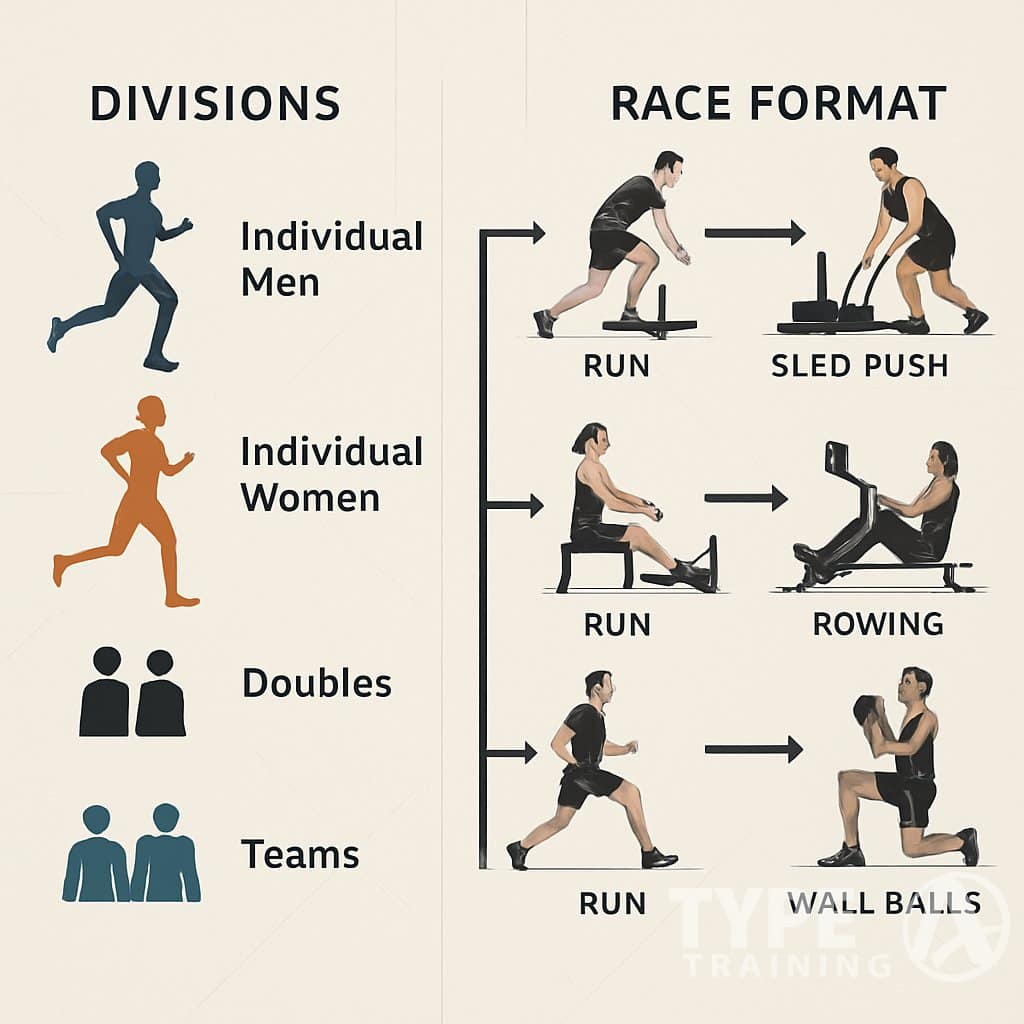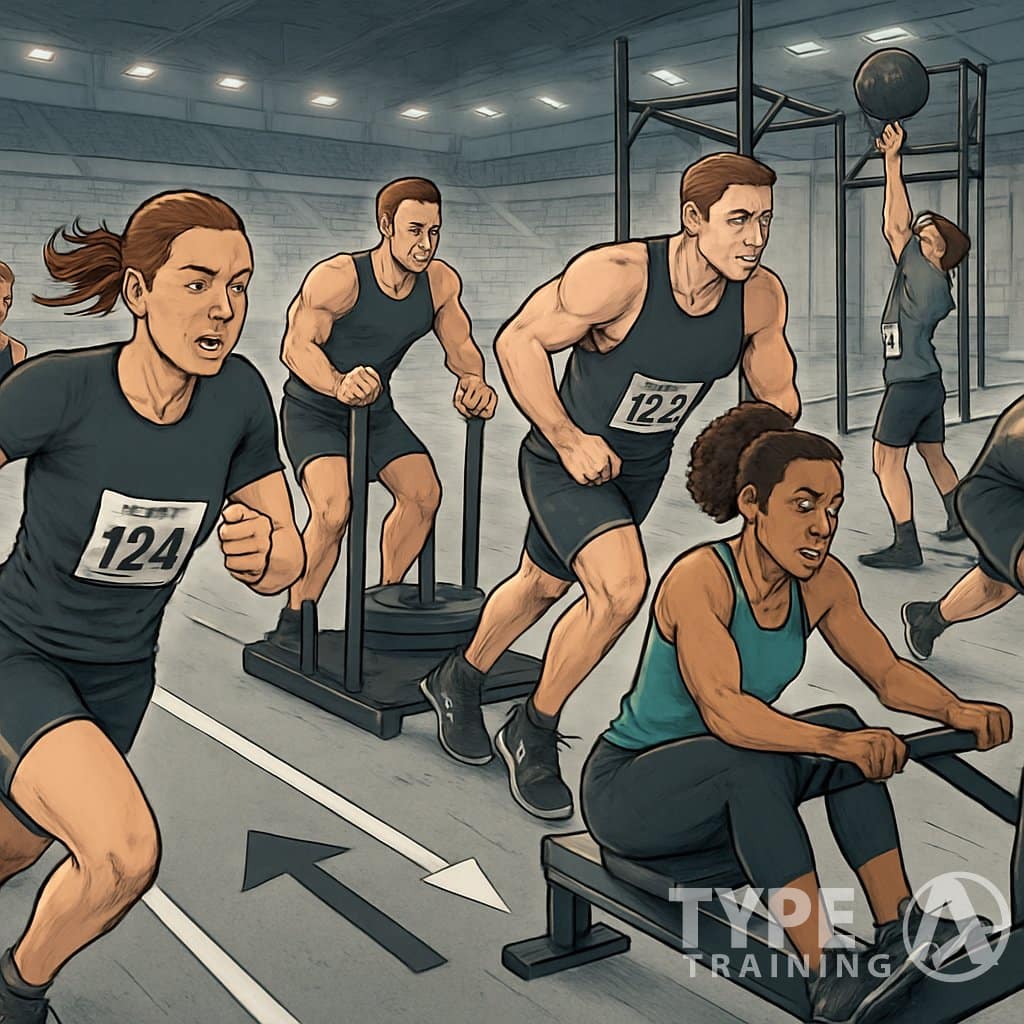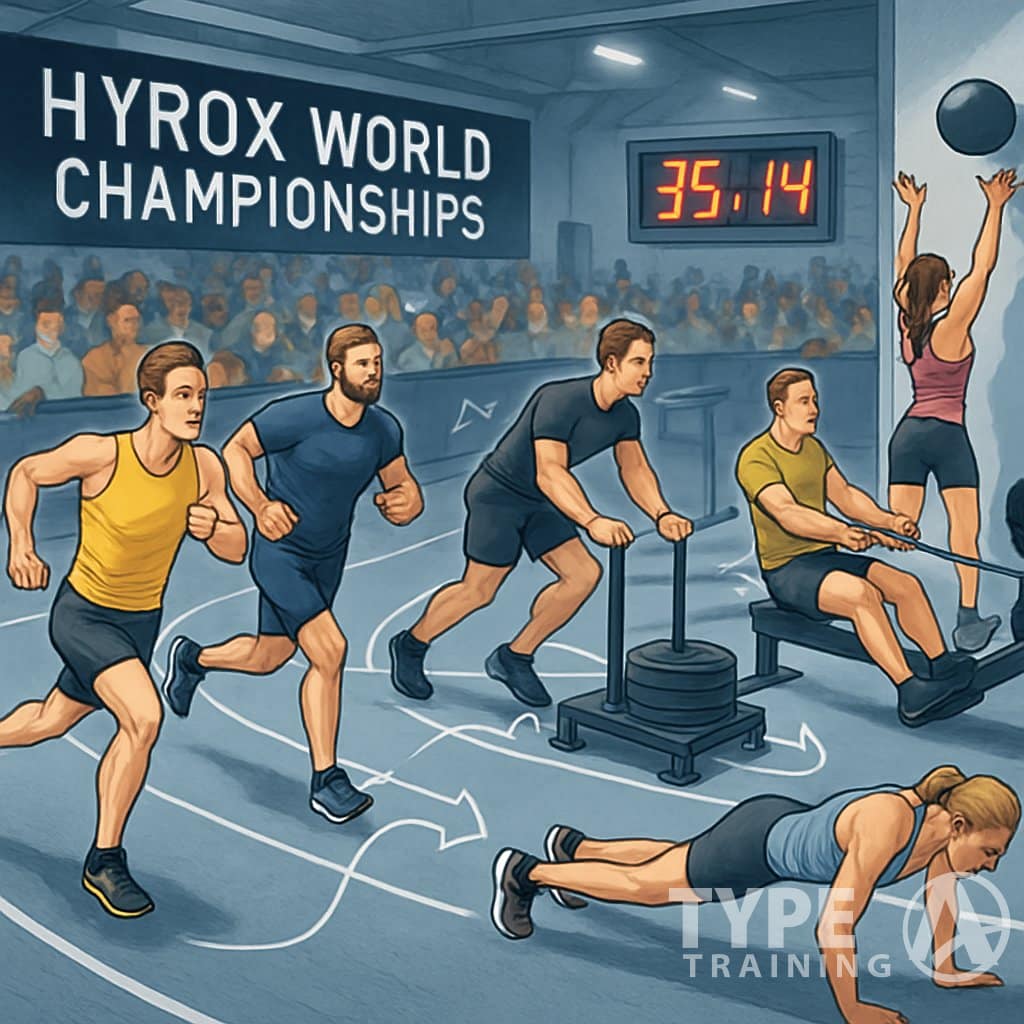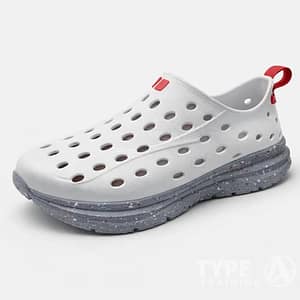If you’re after a fitness challenge that blends endurance and strength without the chaos of outdoor obstacles, HYROX nails it. It’s always indoors, always the same format, no matter where you are in the world.
The HYROX race format is designed to challenge your endurance and strength in a controlled indoor environment.
The HYROX race format is gaining popularity among fitness enthusiasts, making it essential to understand its rules and structure.
You’ll run eight 1-kilometer runs, each followed by a functional workout station. The structure’s predictable, but don’t let that fool you—it’s a grind.
Popular posts:
Understanding the HYROX race format can help you excel and prepare effectively.
By mastering the HYROX race format, you can optimize your training and improve your performance.
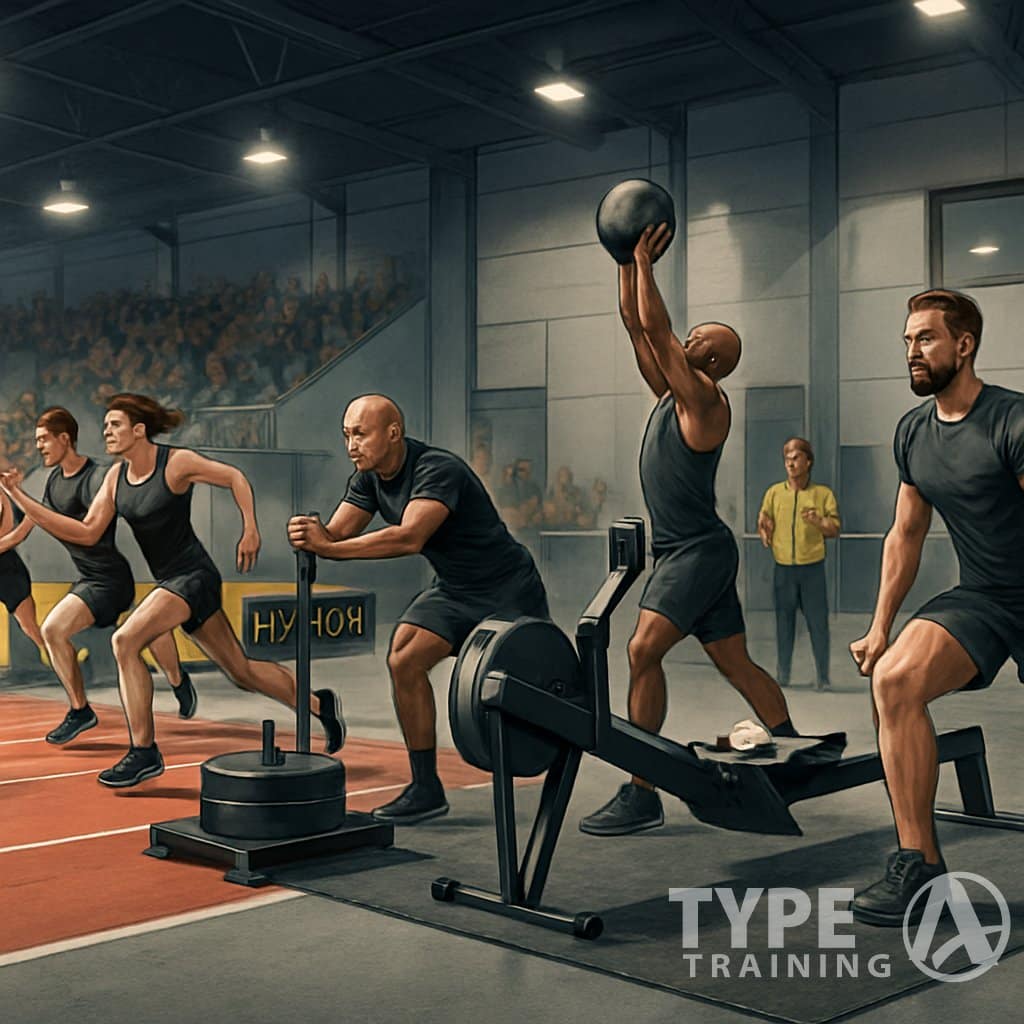
You know what you’re getting into on race day. Everyone faces the same order, the same weights, the same distances, so it’s a fair fight.
This fairness is a hallmark of the HYROX race format, allowing anyone to compete.
That level playing field means there’s a global leaderboard and a shot at the HYROX World Championships if you’re into that.
Key Takeaways
- HYROX mixes running and functional workouts in a fixed pattern
- Knowing the specifics of the HYROX race format can boost your competitive edge.
- The format never changes, wherever you race
- Knowing the structure is half the battle—train for it, and you’ll see results
- Understanding the HYROX race format is crucial for anyone looking to compete effectively.
Overview of the HYROX Race Format
The consistency of the HYROX race format means every athlete knows what to expect.
The clear guidelines of the HYROX race format make it accessible to all fitness levels.
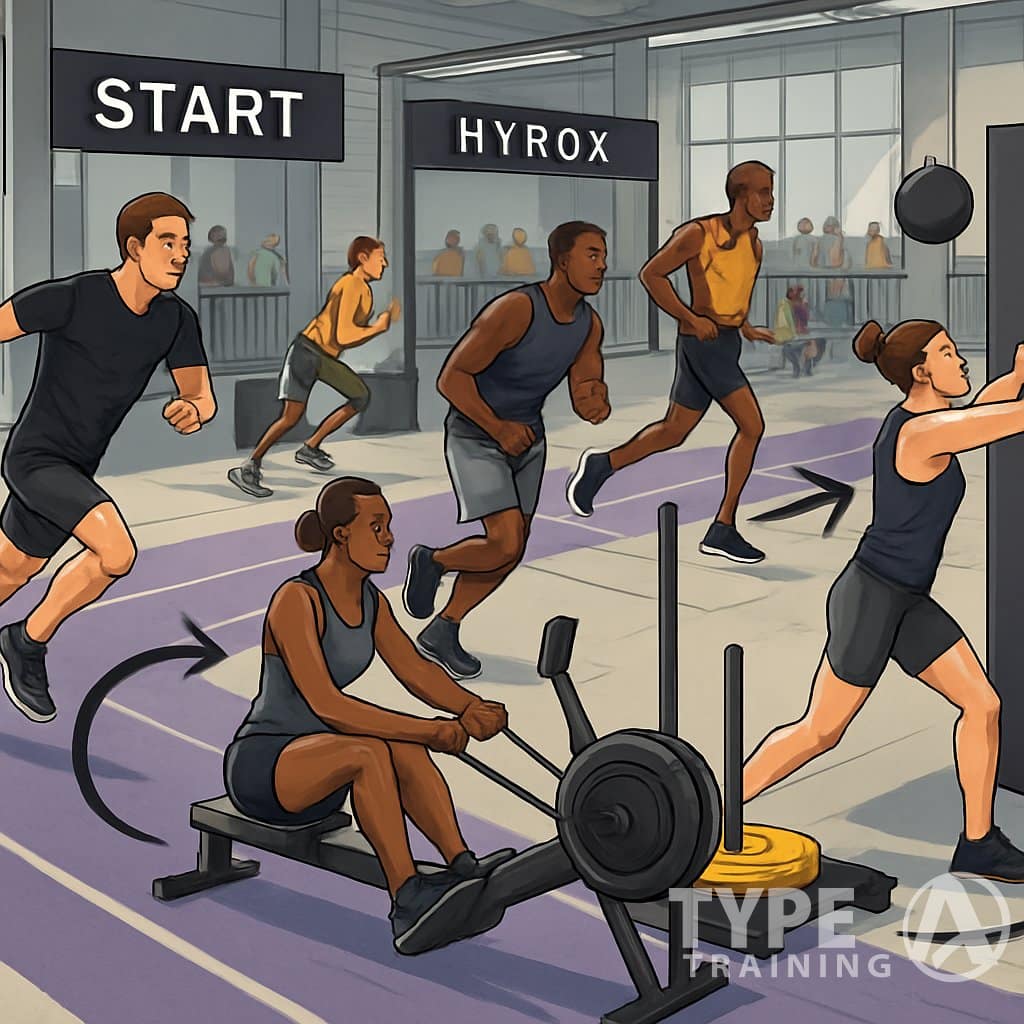
HYROX is a hybrid fitness race that mashes up running and functional strength exercises, always in the same order. You get a format that’s easy to understand, easy to train for, and easy to compare from one event to another.
Every athlete benefits from knowing the HYROX race format inside and out.
Each station in the HYROX race format offers a unique challenge that tests different aspects of fitness.
History and Origins of HYROX
HYROX kicked off in Germany back in 2017. It was the brainchild of Christian Toetzke, a sports marketing guy, and Moritz Fürste, who snagged two Olympic golds in field hockey.
Their idea? Make a race that’s open to anyone, but still tough enough for serious competitors. They wanted something with the excitement of mass-participation races and the burn of functional fitness.
The first HYROX event happened in Hamburg. Right away, it drew both elite athletes and regular gym folks.
They kept everything indoors, so weather’s never an issue and conditions are always controlled.
With repeatable workouts and a locked-in race format, HYROX could spread fast. Now you’ll find it in big cities across Europe, North America, and beyond.
The HYROX race format’s growth indicates its popularity among fitness enthusiasts worldwide.
Core Principles of the Competition
HYROX keeps it simple. You run 8 rounds of 1 km each, and after every run, there’s a functional workout station.
The structure of the HYROX race format helps participants to strategize their training.
That’s 8 km of running, 8 workout stations, and no guesswork about what’s next.
The stations hit all sorts of fitness: strength, endurance, power. Think sled pushes, rowing, burpee broad jumps, wall balls—nothing too weird, but nothing easy either.
Adapting to the HYROX race format can improve your overall endurance and strength.
Everyone gets the same challenge, whether you’re new or a pro. That way, you can see your progress and compare yourself to anyone, anywhere.
Global Standardization and Accessibility
What sets HYROX apart is how it’s the same everywhere. New York, London, Berlin—the course never changes.
This means you can train for it in your local gym, knowing exactly what’s coming. A lot of people follow HYROX-specific programs to shave time off their results.
It’s not just for solo competitors. There are divisions for individuals, doubles, and relay teams. You pick what fits your vibe and ability.
Step-by-Step Breakdown: How the HYROX Race Works
Training effectively is easier when you understand the HYROX race format thoroughly.
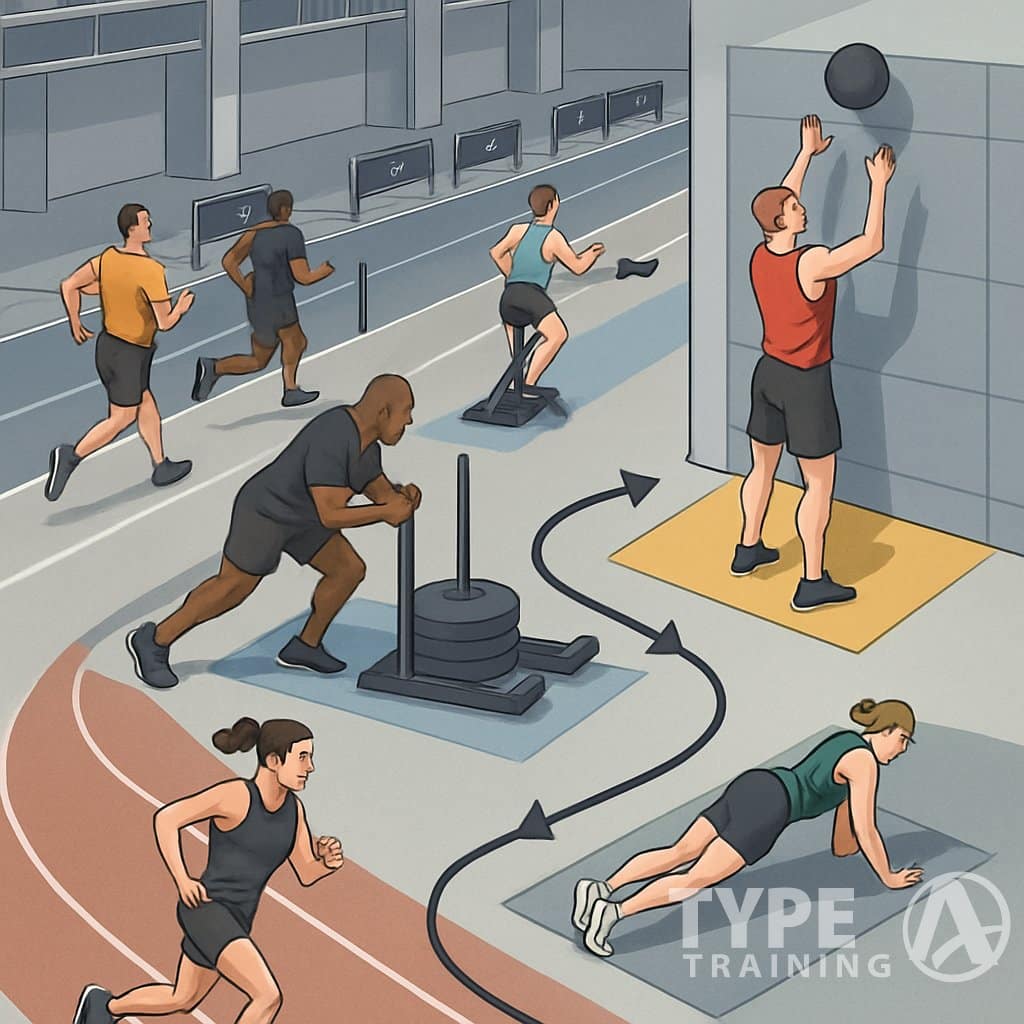
HYROX sticks to a set format: running mixed with functional workout stations. It’s easy to follow, easy to judge, and totally fair.
This unique HYROX race format keeps competitors engaged and motivated.
Race Structure and Sequence
You’ll go through eight workout stations, each split up by a 1 km run. That’s 8 km of running and 8 stations, no surprises.
Familiarizing yourself with the HYROX race format will enhance your performance on race day.
Familiarity with the HYROX race format allows competitors to enhance their performance on race day.
The order never changes, so you can drill it into your training. Here’s how it goes:
- 1 km Run
- SkiErg (1,000 m)
- 1 km Run
- Sled Push (50 m)
- 1 km Run
- Sled Pull (50 m)
- 1 km Run
- Burpee Broad Jumps (80 m)
- 1 km Run
- Rowing (1,000 m)
- 1 km Run
- Farmers Carry (200 m)
- 1 km Run
- Sandbag Lunges (100 m)
- 1 km Run
- Wall Balls (100 reps for men, 75 for women)
You’ll get tested on endurance and strength. Managing your pace is everything.
Transition Zones and Flow
You move straight from the run into the workout, then right back to running. The transition zones are crystal clear, so you’re not wandering around lost.
The clear transitions in the HYROX race format help maintain momentum throughout the competition.
Stations are set up in order around the venue, looping you back onto the running track each time. It keeps things moving—no awkward pauses.
No rest breaks here. Finish the station, and you’re off on the next run. If you don’t manage your breathing and pace, you’ll burn out fast.
Crowd energy and judges are at every station. They’ll check your reps and make sure you’re doing things right before you move on.
Timing and Scoring
Understanding the timing in the HYROX race format is crucial for effective pacing.
Your performance in the HYROX race format reflects your dedication to training and preparation.
Your total race time is what matters. The clock starts when you cross the line and stops after your last Wall Ball rep.
There’s no separate score for running or workouts. It’s all one big effort, so if you go too hard on a station, your next run might get ugly.
Judges keep an eye on your reps and standards. Mess up a rep? You’ve gotta redo it until it’s right.
Because the format’s identical everywhere, your time stacks up against athletes anywhere in the world.
Competitors must adapt to the challenges of the HYROX race format for the best results.
The uniformity of the HYROX race format allows for accurate comparisons of performance.
Detailed Guide to HYROX Workout Stations
Each HYROX race throws you into running and a set list of functional stations. The order’s locked in, and every station has its own standards.
Success comes down to pacing, good form, and knowing how to handle fatigue when it hits. It’s a mental game as much as a physical one.
Strategies specific to the HYROX race format can lead to remarkable improvements.
SkiErg Station
The SkiErg kicks off your workouts after that first run. You’ll pull handles down in a standing ski motion, kind of like cross-country skiing.
The SkiErg is a vital component of the HYROX race format that prepares athletes for the workout ahead.
The SkiErg is an integral part of the HYROX race format, designed to warm up your muscles.
It hits your lats, shoulders, and core, and you’ve got to keep your breathing steady.
Cover 1,000 meters, but don’t blow out your energy. Smooth, consistent strokes work better than going all out too soon.
Try to keep your splits even. Focus on rhythm—bend at the hips, brace your core, and pull with both arms together.
Sled Push and Sled Pull
The sled push and pull are brutal. First, you push a heavy sled 50 meters, then you pull it back using a rope while walking backward.
Pushing the sled lights up your quads, glutes, and calves. Lean in, brace your core, and use quick, controlled steps. Foot placement matters—slip, and you’re wasting energy.
Pulling the sled hits your hamstrings, back, and forearms hard. Stay low, keep the rope tight, and move backward with purpose. Your grip will get tired, so practice holding on and pacing the pull.
Burpee Broad Jumps and Rowing
Burpee broad jumps are just what they sound like. Drop for a burpee, then jump forward. Repeat until you hit the distance.
Understanding the techniques for each exercise in the HYROX race format can give you an edge.
Efficiency is huge here. Don’t over-jump—short, steady hops are usually faster and less tiring. Keep your chest low during burpees to save time.
Rowing comes later, and it’s another 1,000 meters. Pacing is everything. Drive with your legs, hinge at the hips, then pull with your arms. Smooth strokes keep your heart rate in check.
Farmers Carry, Sandbag Lunges, and Wall Balls
Completing the wall balls is essential in the HYROX race format to finish strong.
Farmers carry means picking up heavy kettlebells or dumbbells and walking 200 meters. Grip strength and posture are key.
Keep your shoulders back and your core tight. Short steps help you stay balanced, especially when you’re tired.
Mastering the skills required in the HYROX race format can lead to significant performance improvements.
Sandbag lunges are next. You’ll carry a sandbag on your shoulders and lunge for 100 meters. Stay upright, take controlled steps, and breathe—your legs will be screaming.
Wall balls finish the race. Squat with a medicine ball, then throw it up to a target. You need 100 reps (75 for women). Find a rhythm and stick with it; missing the target means more work.
Divisions and Categories in HYROX Competition
HYROX keeps the race format the same everywhere, but you’ve got choices on how to compete. Divisions and categories let you pick what matches your fitness, goals, or whether you want to go solo or team up.
Choosing the right division in the HYROX race format can impact your experience.
Open, Pro, and Elite Divisions
The Open Division is the entry point. You do the full race with standard weights and movements. It’s tough, but manageable—most first-timers start here.
The Pro Division ups the ante. Heavier weights, more demanding movements. If you’re experienced and want a real test, this is your lane.
The Elite category is for the best of the best. You usually have to qualify, and these folks show up at big events like the HYROX World Championships. If this is your goal, you’ll need serious training and consistency.
Understanding the criteria for each division in the HYROX race format is vital for competitors.
| Division | Key Features | Best For |
|---|---|---|
| Open | Standard weights, full race format | First-timers, general fitness |
| Pro | Heavier weights, advanced challenge | Experienced athletes |
| Elite | Top qualifiers, global ranking | Professional-level competitors |
Doubles and Relay Formats
The Doubles Division lets you race with a partner. Both of you run all the segments, but you split up the workout stations however you like. Maybe one of you loves sled pushes while the other would rather tackle wall balls. This setup works if you want to share the load but still get the full HYROX experience.
The Relay Division uses a team of four. Each teammate runs 2 km and completes two workout stations before tagging the next person. It’s shorter for each athlete, but your team still covers the entire race.
The relay format offers a unique spin on the HYROX race format, promoting teamwork.
Team formats make HYROX a lot more social. You can compete even if you’re not quite up for the solo challenge, and you get to lean on your teammates’ strengths when you need to.
Age Groups and Fitness Levels
HYROX splits athletes into age brackets to keep things fair. The usual groups are 18–34, 35–49, and 50+. Within each, you can choose Open or Pro, so you’re up against people with similar age and fitness.
You won’t have to compare yourself to someone decades older or younger. It’s also easier to see how you stack up against your own peers.
Fitness level matters too. Beginners usually go for Open, while advanced folks might try Pro. This way, everyone finds a place—whether you’re just starting out or chasing elite rankings.
What Sets HYROX Apart from Other Fitness Races
The distinctiveness of the HYROX race format makes it appealing to a wide range of athletes.
HYROX stands out for its consistent format and indoor setting. Athletes from all over the world can compare results directly, since every race uses the same structure. You’re racing the clock in a controlled environment, but you’re also part of a big, global community.
Comparison to CrossFit and Obstacle Races
CrossFit competitions always seem to mix things up. You never really know what movements or weights they’ll throw at you. HYROX, though, sticks to the same format every time: eight 1 km runs paired with eight workout stations. It’s predictable, so you can prepare and actually track your progress.
Obstacle races like Spartan or Tough Mudder are all about unpredictable terrain and outdoor obstacles. HYROX doesn’t bother with that. No matter where you race, you face the same challenge as everyone else.
This makes HYROX feel more like a true fitness racing event—not just a test of improvising or adapting to the weather. You’re measuring yourself against other people, not just the day’s conditions.
Competitors appreciate the structured nature of the HYROX race format when training.
Indoor Race Environment
HYROX events take place indoors, usually in big convention centers or arenas. You don’t have to worry about rain, mud, or uneven ground messing up your race. The course is flat, and you move straight from one station to the next.
The indoor setup adds predictability. You know the distances, the stations, and the order, so you can actually plan your strategy.
Spectators get a better view in this environment. Friends and family can watch the whole race without missing anything. Honestly, it makes HYROX feel more organized as a fitness event—good for athletes and supporters alike.
The indoor environment of the HYROX race format enhances both spectator and athlete experiences.
Community and Global Appeal
Since the format never changes, HYROX can keep global leaderboards. Your time in one city lines up perfectly with someone else’s in another country. There’s a worldwide community of athletes all following the same standard.
Both pros and everyday fitness fans are welcome. You can race solo, in doubles, or as part of a relay—so there’s something for everyone.
HYROX also hosts a World Championship at the end of each season, giving ambitious athletes a shot at the top while keeping the event open to anyone who wants to join.
Achieving your goals in the HYROX race format requires commitment and strategic training.
With the HYROX race format, athletes have a clear path to pursue their championship dreams.
Path to the HYROX World Championships
The HYROX World Championships bring together the fastest and most consistent athletes from all over. If you want to get there, you’ll need to qualify at official races, compete for world titles, and see how you stack up against the sport’s best.
Qualifying for the World Championships
You can qualify for the HYROX World Championships by earning a top placement at any sanctioned HYROX race. Every event uses the same format, so your results are always comparable worldwide.
Qualification goes by age group categories, so you’re competing fairly within your bracket. Usually, you’ll need to finish near the top of your division at a regional or international event.
Age group categories in the HYROX race format ensure fair competition among participants.
Since all times go on a global leaderboard, you might also qualify just by ranking high across the season. Sometimes it’s about being consistent, not just having one perfect day.
HYROX World Champion Titles
The World Championships award titles in several categories. The top honor is Elite World Champion, given to the fastest male and female overall.
You can also compete for Age Group World Champion titles, with brackets like 16–24, 25–29, 30–34, and so on. That way, you’re up against others in your own age range.
Winning within the HYROX race format can lead to recognition on a global stage.
There are doubles and relay categories too, where teamwork really matters. Individual titles get the most spotlight, but these formats offer another shot at the podium and showcase different strengths in HYROX.
Notable Athletes and Performances
Over the years, a handful of athletes have really set the bar for what’s possible in HYROX. Elite competitors sometimes post sub-60-minute finishes, which is honestly just wild and represents world-class fitness.
Some of the top names in the sport come from endurance running, CrossFit, or functional fitness backgrounds. Their results prove that you need both strength and speed to really compete at the highest level.
Notable performances in the HYROX race format inspire many aspiring athletes.
Watching these athletes race can teach you a lot about pacing and moving between stations. You might even pick up a trick or two on how to manage fatigue.
